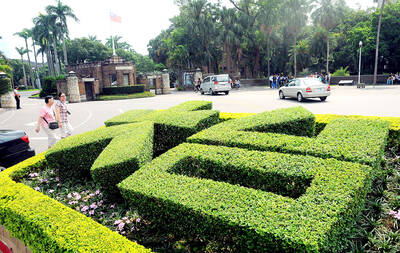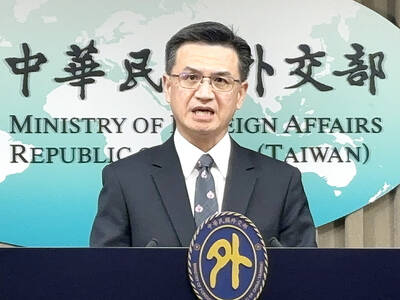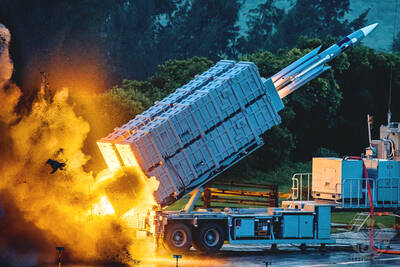Teams of gunmen attacked three law enforcement facilities across the eastern city of Lahore yesterday, paralyzing Pakistan’s cultural capital, while a car bomb devastated a northwestern police station, killing a total of 38 people in an escalating wave of terror in this nuclear-armed US ally.
Another bombing in the northwestern city of Peshawar later in the day wounded five people, further rattling the country.
The bloodshed, aimed at scuttling a planned offensive into the militant heartland along the Afghan border, highlights the militants’ ability to carry out sophisticated strikes on heavily fortified facilities and exposes the failure of the intelligence agencies to adequately infiltrate the extremist cells.
No group immediately claimed responsibility.
The attacks yesterday were the latest to underscore the growing threat to Punjab, the province next to India where the Taliban are believed to have made inroads and linked up with local insurgent outfits.
Pakistani President Asif Ali Zardari said the bloodshed that has engulfed the country over the past 11 days would not deter the government from its mission to eliminate the violent extremists, according to a statement on the state-run news agency.
“The enemy has started a guerrilla war,” Pakistani Interior Minister Rehman Malik said. “The whole nation should be united against these handful of terrorists, and God willing we will defeat them.”
The wave of violence practically shut down daily life in Lahore. All government offices were ordered shut, the roads were nearly empty, major markets did not open and stores that had been open pulled down their shutters.
The assaults began just after 9am when a group of gunmen attacked a building housing the Federal Investigation Agency, a law enforcement branch that deals with matters ranging from immigration to terrorism.
Soon after, a second band of gunmen raided a police training school in Manawan on the outskirts of the city in a brief attack that killed nine police officers and four militants, police and hospital officials said. One of the gunmen was killed by police at the compound and the other three blew themselves up.
A third team of at least eight gunmen scaled the back wall of an elite police commando training center not far from the airport and attacked the facility, Lahore police chief Pervez Rathore said.
A family barricaded itself in a room in a house, while the attackers stood on the roof, shooting at security forces and throwing grenades, said Lieutenant General Shafqat Ahmad, the top military official in Lahore.
Two attackers were slain in the gunbattle and three blew themselves up, he said. One police nursing assistant and a civilian also died in the attack, he said.
In the northwest, meanwhile, a suicide car bomb exploded next to a police station in the Saddar area of Kohat, collapsing half the building and killing 11 people — three police officers and eight civilians — Kohat police chief Abdullah Khan said.
Early yesterday evening, a bomb planted in a car outside a home in the Gulshan Rehman area of Peshawar city exploded, city police chief Ijaz Khan said. A nearby school was closed at the time. Local police official Aalam Sher said five wounded people were hospitalized.

Taiwan has experienced its most significant improvement in the QS World University Rankings by Subject, data provided on Sunday by international higher education analyst Quacquarelli Symonds (QS) showed. Compared with last year’s edition of the rankings, which measure academic excellence and influence, Taiwanese universities made great improvements in the H Index metric, which evaluates research productivity and its impact, with a notable 30 percent increase overall, QS said. Taiwanese universities also made notable progress in the Citations per Paper metric, which measures the impact of research, achieving a 13 percent increase. Taiwanese universities gained 10 percent in Academic Reputation, but declined 18 percent

Chinese President Xi Jinping (習近平) yesterday met with former president Ma Ying-jeou (馬英九) at the Great Hall of the People in Beijing, with Xi’s opening statement once more emphasizing that people on both sides of the Taiwan Strait are Chinese and that foreign intervention cannot change their inevitable unification. Xi said that 5,000 years of history of zhonghua minzu (中華民族, ethnic Chinese group) have seen their ancestors move to Taiwan to establish new lives, while also documenting them fighting side-by-side against foreign forces and finally freeing Taiwan. “Both sides are Chinese,” and there are no issues that cannot be worked through, he

BULLY TACTICS: Beijing has continued its incursions into Taiwan’s airspace even as Xi Jinping talked about Taiwan being part of the Chinese family and nation China should stop its coercion of Taiwan and respect mainstream public opinion in Taiwan about sovereignty if its expression of goodwill is genuine, the Ministry of Foreign Affairs (MOFA) said yesterday. Ministry spokesman Jeff Liu (劉永健) made the comment in response to media queries about a meeting between former president Ma Ying-jeou (馬英九) and Chinese President Xi Jinping (習近平) the previous day. Ma voiced support for the so-called “1992 consensus,” while Xi said that although the two sides of the Taiwan Strait have “different systems,” this does not change the fact that they are “part of the same country,” and that “external

UNDER DISCUSSION: The combatant command would integrate fast attack boat and anti-ship missile groups to defend waters closest to the coastline, a source said The military could establish a new combatant command as early as 2026, which would be tasked with defending Taiwan’s territorial waters 24 nautical miles (44.4km) from the nation’s coastline, a source familiar with the matter said yesterday. The new command, which would fall under the Naval Command Headquarters, would be led by a vice admiral and integrate existing fast attack boat and anti-ship missile groups, along with the Naval Maritime Surveillance and Reconnaissance Command, said the source, who asked to remain anonymous. It could be launched by 2026, but details are being discussed and no final timetable has been announced, the source